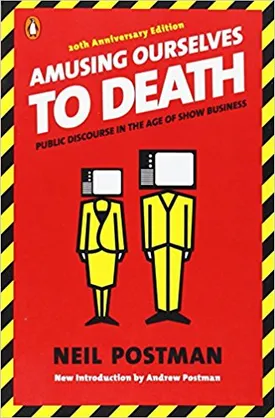Amusing Ourselves to Death: Public Discourse in the Age of Show Business by Neil Postman
Amusing Ourselves to Death: Public Discourse in the Age of Show Business by Neil Postman is a 1985 dystopian book that analyzes the effects of TV, mass media, and the popular culture on politics, education, and public discourse. Postman argues that the medium of television is hijacking the culture and leading to an overall decline in the quality and importance of public discourse. He examines a wide range of concerns from the rise of celebrity culture and the proliferation of entertainment as news to the way political campaigns and social discourse have become overrun with flashy images and shows.
In the book, Postman makes the argument that television has completely changed the way people perceive their world, their relationships, and their communication with one another. Postman points to television's focus on soundbites, quick cuts, and flashy images as the cause of major shifts in the way news and political discussions are held, informing viewers that they must condense and simplify important issues in order to effectively communicate them on TV.
He highlights how this influence of television has led to a society that is focused on entertainment rather than real discourse, with people increasingly deriving their opinions from celebrity opinions and the soundbite impressions from news clips. He argues that this type of superficial interaction leads to the dilution of meaningful public discourse, with society more concerned with spectacle than with the need for knowledge.
Postman's argument is well supported throughout the book. To support his point, he looks at popular television shows of the time, political campaigning, and the decline of newspapers during that era. He also looks at the media's role in influencing public opinion and its tendency to shape our views by bombarding us with images and appealing sound bites. Postman then applies his argument to education and the sciences, pointing to how teaching styles have shifted from teaching what is important to what appears to be most entertaining and marketable.
Postman's analysis of public discourse is spot–on, and he is able to make a convincing case for why it has become more and more difficult for persons to discuss complex issues in an informed and meaningful way. He does a great job of examining the detrimental effects of mass media and the resulting decline in quality of public discourse, bringing insight and clarity to the topic.
All in all, Amusing Ourselves to Death: Public Discourse in the Age of Show Business is an insightful work that provides readers with a comprehensive analysis of how television and mass media have changed the way we interact and communicate. Postman's arguments are well-supported and thought-provoking, making it not only an essential read for anyone interested in media and its effects on public discourse, but also a book that can help us all think deeper about the ways in which we communicate with the world.

